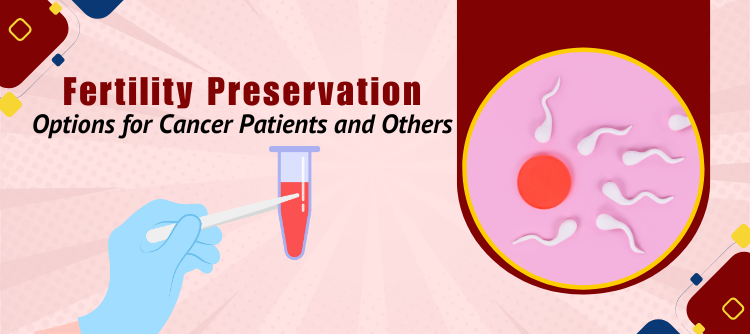Fertility Preservation: Options for Cancer Patients and Others

Cancer and certain medical treatments can impact an individual’s ability to have children in the future. However, advancements in reproductive technology have made fertility preservation a viable option for those facing such challenges. In this blog, we will explore the various fertility preservation methods available, with a focus on cancer patients and others who may not be ready to conceive yet.
Egg Freezing (Oocyte Cryopreservation)
Egg freezing has become an increasingly popular fertility preservation option for women. This process involves stimulating the ovaries with hormones to produce multiple eggs, which are then retrieved and frozen through a process called verification. These frozen eggs can be stored for years and used for future in vitro fertilization (IVF) attempts.
For cancer patients, egg freezing may be recommended before starting chemotherapy or radiation therapy, as these treatments can damage the ovaries and lead to premature ovarian failure or infertility. Women who are not ready to conceive for personal or career reasons may also choose to freeze their eggs to preserve their future fertility potential.
Embryo Freezing
Embryo freezing involves the creation of embryos through IVF and then freezing them for future use. This option is suitable for women who have a partner or are willing to use donor sperm. The embryo is created by fertilizing the retrieved eggs with sperm, and the resulting embryos are frozen and stored.
For cancer patients with a partner, embryo freezing may be a preferred option as it allows for the preservation of both the male and female genetic material. This method also eliminates the need for additional egg retrieval and fertilization procedures in the future.
Sperm Freezing (Sperm Cryopreservation)
Sperm freezing is a relatively simple and less invasive fertility preservation option for men. It involves collecting and freezing sperm samples, which can be stored indefinitely and used for future IVF or intrauterine insemination (IUI) procedures.
For male cancer patients, sperm freezing is often recommended before undergoing chemotherapy or radiation therapy, as these treatments can impair sperm production or quality. Men who are not ready to have children immediately may also choose to freeze their sperm as a precautionary measure.
Ovarian Tissue Freezing
Ovarian tissue freezing is an experimental fertility preservation option that involves surgically removing and freezing a portion of the ovarian tissue. This tissue can be re-implanted later, potentially restoring ovarian function and fertility.
This method may be suitable for cancer patients who cannot delay treatment for egg freezing or for those with certain types of cancer that may affect the success of other fertility preservation techniques.
Testicular Tissue Freezing
Similar to ovarian tissue freezing, testicular tissue freezing is an experimental method for preserving male fertility. A small portion of testicular tissue is removed and frozen, with the potential for future use in assisted reproductive technologies.
This option may be considered for pre-pubertal boys with cancer or men who cannot produce a viable sperm sample for sperm freezing.
Fertility-Sparing Surgery
In some cases, surgical techniques may be employed to preserve fertility in cancer patients. For example, in certain types of gynecological cancers, fertility-sparing surgery may be an option, where only the affected part of the reproductive organs is removed, leaving the remaining organs intact.
It’s important to note that the success of fertility preservation techniques can vary, and factors such as age, underlying medical conditions, and the specific cancer treatment plan may influence the outcomes. Open communication with healthcare providers and reproductive specialists is crucial to understanding the options and making informed decisions.
Cancer patients and those considering fertility preservation for other reasons should discuss their options with their healthcare team as early as possible. Timely action can increase the chances of successful fertility preservation and future family-building opportunities. Consulting with a specialized Fertility Centre in Jaipur can provide access to advanced fertility preservation methods and personalized care plans.
Remember, while facing medical challenges or personal circumstances that may impact fertility can be daunting, modern reproductive technology offers hope for preserving the ability to have children in the future.
